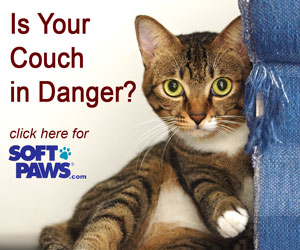Why Does My Cat Chew Plastic Bags?

If you have many cats throughout your life, the odds are pretty good that you'll eventually have one that seems to be obsessed with licking, chewing on, or eating plastic grocery or trash bags. Many people ask their vet why their cat likes plastic bags so much.
What Is Pica in Cats?
Pica is the eating of non-food items. Some of the more commonly-chewed-on items for cats include wool, blue jeans, metal, plastic bags, hard plastic, and fake plants.
Pica can be incredibly dangerous because some or all of what the cat chews on can make it down their throat, where it may cause a serious stomach or intestinal obstruction.
What Causes Pica in Cats?
Kittens often lick or chew on all kinds of things to explore their environment and learn about the world around them. Pica can be a manifestation of that curiosity. However, to truly be diagnosed with pica, a cat must have a long-term habit of chewing on and eating non-food items.
Some cats develop pica due to a medical condition, including some of the following:
- A condition resulting in malabsorption of nutrients like a GI tract problem
- Diabetes mellitus
- Brain tumor
- Anemia
- Feline leukemia virus (FeLV) or feline immunodeficiency virus (FIV)
- Dental disease
- Hyperthyroidism
Cats might engage in pica if they're stressed as a way to self-soothe. Consider this to be similar to when a person chews their nails when nervous. Some cats can suffer from stress to such a substantial degree that they develop an obsessive-compulsive disorder and that's what causes their pica.
Boredom can result in pica for some cats because they're looking for a way to amuse themselves.
Some cats develop pica or, more commonly, wool-sucking, when they're removed from their mother early.
For unknown reasons, pica is more common in Oriental cat breeds like Siamese.
Why Plastic Specifically?
So why do so many cats specifically like plastic bags?
It's not clear for sure why so many cats seem to focus on plastic bags for chewing. It's possible the sound they make reminds them of prey. The sound and feeling could be soothing and pleasurable, so the kitty gets positive reinforcement every time he does it.
How Can You Curb Plastic Bag-Eating Behavior?
Here are some ways for you to attempt to train your cat to leave plastic bags alone:
- First, always visit the veterinarian to be sure there isn't a medical reason for the behavior, especially if it occurs out of the blue or is associated with other new behaviors.
- Increase the time you spend playing interactively with your cat. Use wand toys to simulate prey so he can get his urge to hunt satisfied every day. That should help if the cause is boredom or stress.
- If you're aware of a specific situation stressing your cat out, try to mitigate that the best you can. Consider adding a Feliway diffuser to the area your cat seems stressed to help calm him.
- Make sure there's enriching stuff for your cat to do when you aren't home. Puzzle toys are great for this—they give your cat something to focus on, mentally, while you aren't there, and they also help satisfy cats' prey drives.
- Don't skimp on scratching posts. Never underestimate the stress release cats get from scratching, and make sure you're providing enough opportunity for yours to scratch and let off steam.
- Try behavior modification. Put a plastic bag out while you're nearby to supervise. When your cat goes to chew on it, redirect him by tossing a toy in a different direction. Give him lots of praise when he chases the toy and leaves the plastic bag. You may also use a treat if your cat is motivated by them. You will need to repeat this often to teach your cat that leaving plastic alone and doing something else is more rewarding than chewing on plastic.
- Some cats that exhibit signs of obsessive-compulsive disease may benefit from treatment with anti-anxiety medication. Speak with your veterinarian before starting any medication because cats are highly sensitive to many drugs.
Always keep all plastic bags picked up and out of reach of your cat if he's shown a propensity for chewing on them. Swallowing parts of or full plastic bags can result in life-threatening GI obstructions. They can also be a suffocation, choking, or strangulation risk.





